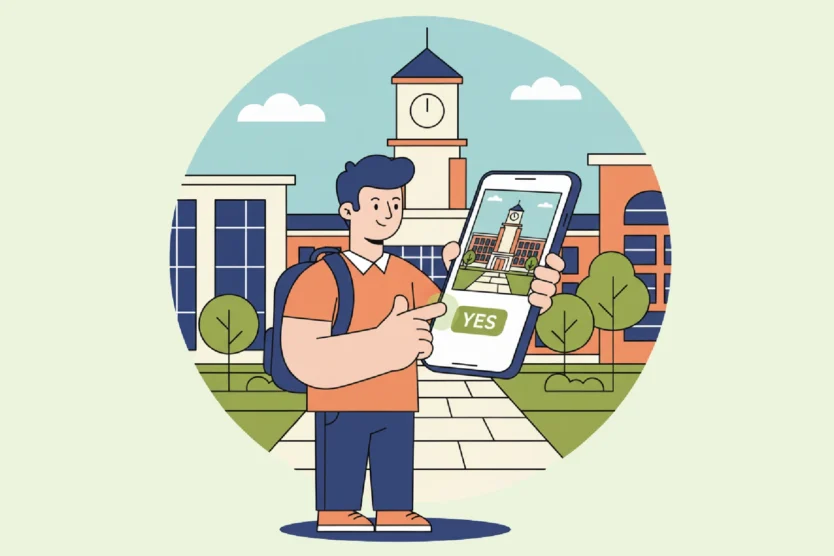
October 21, 2025 · Season 2 · Episode 12
How to Find a College You Can Swipe Right On
By Jasmine Brown & Gage
Looking for a college that’s a total match? In today's episode, Gage and College Planning Specialist Jasmine Brown talk green flags, red flags, and everything to look for while finding your perfect college fit.
Choosing a college can feel a lot like dating apps…so many options, each promising to be “the one.” In our recent Countdown2College podcast, EducationQuest College Planning Specialist Jasmine Brown shared how to find a school that fits your goals, budget, and personality. From narrowing your list to visiting campuses and comparing financial aid offers, these tips will help you confidently find and commit to your perfect college match.
Start With a Major
First things first, look for schools that offer your program or field of study before narrowing it down further using factors such as location, campus size, and cost. It’s a simple way to focus on what matters most and avoid wasting time on schools that don’t fit your plans. Then, examine the details that will shape your college experience, including student support, class size, and opportunities for involvement.
Apply Early & Stay Focused
If you’re a senior, now is the time to apply to your top three schools that will give you flexibility and peace of mind. This is also a great time to schedule campus visits and chat with admission representatives at college fairs or via email. Missed your school’s college fair? No problem! Admission reps love helping students and can answer all kinds of questions about deadlines, scholarships, or programs.
Use College Profiles
EducationQuest’s College Profiles tool is your best friend when comparing schools. You can search by a variety of criteria, including major, state, size, and activities, so you can instantly see how colleges stack up against one another. A side-by-side comparison view makes it easy to remember what you liked, and what didn’t stand out. Plus, it’s free and eliminates the guesswork of comparing options.
Find Balance
Picking a college isn’t just about cost; it’s about how you feel there. Jasmine suggests making a quick pros and cons list for each school. Include real numbers such as tuition and scholarships, as well as intangibles like campus vibe and comfort level. The goal is to find a school that suits both your budget and your energy level.
Visit Before You Commit
Campus visits can make or break your decision. Photos are nice, but nothing beats walking around, checking out the dorms, or grabbing lunch in the dining hall (pro tip: many schools offer a free meal!). Pay attention to how the campus feels: is it a friendly, busy, or laid-back environment? If something doesn’t click, that’s okay! Campus visits are all about figuring out where you belong.
Go Beyond The Major
Once you’ve confirmed that a school offers your major, dig deeper. Check the school’s academics page for information about internships, research opportunities, or support services. If you’re visiting, ask about program-specific tours or meet a student in that major. You’ll get a better sense of what your day-to-day life might look like, and whether that school truly supports your goals.
Talk Money Early
Money talk might feel awkward, but it’s essential. Jasmine recommends that families start those conversations long before senior year. Get ready for the Free Application for Federal Student Aid (FAFSA) by gathering necessary materials early and submitting your application as soon as it opens each fall. Once schools receive your FAFSA results, they’ll send financial aid offers your way, which may include scholarships, grants, work-study, and loans. Compare the offers side by side to see which school gives you the best deal.
Think About Distance
How far from home do you want to be? Out-of-state schools can be an amazing experience, but they often come with higher tuition and additional travel costs. If you know you’ll miss home, choosing a college within a two- to three-hour drive can make the adjustment easier. On the other hand, if you’re ready for a new start, be sure to find ways to build your own support system on campus.
City vs Small Town
Location shapes a college experience. Big-city universities offer a ton of energy, events, and opportunities, but also larger class sizes. Smaller or rural schools can mean a greater sense of connection and smaller class sizes. Also, consider your major. Agriculture or natural sciences might thrive in a rural setting, while business or media studies may be better served in an urban area.
Find Your People
College isn’t just about academics; it’s about finding your community. Look into clubs, organizations, and activities to see how students connect. Ask about social events, student leadership, and campus traditions. And if you don’t see a club that fits your interests, ask how to start one! Feeling connected on campus makes all the difference in how much you enjoy your college years.
You’re Not Alone
Need help sorting through your college list or reviewing financial aid offers? EducationQuest offers free help with everything from FAFSA to scholarship searches. Schedule an appointment with one of our college planning specialists today to get one step closer to finding your perfect college match.
